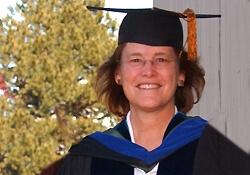Don’t expect to find psychology professor Lynne Bond at the podium, lecturing for 50 minutes about the psychology of women, or about how people develop concepts of knowledge and truth. Instead she’ll probably be listening, soliciting ideas and encouraging responses, facilitating collaboration among students. In fact, she probably won’t even be at the front of the classroom; more likely her class will be gathered together in a circle, and Bond will be among the students, leaning forward, giving them her full attention.
Her way of being in a classroom is in keeping with the insights she’s gained from her academic research, as well as her experiences as a mother, traveler and lifelong student. They are right for her, and apparently right for numerous students present and past who have sung her praises, helping Bond to earn the 2008 George V. Kidder Faculty Award, presented annually by UVM’s Alumni Association.
Perhaps one reason why her students are so effusive about Bond is that she takes them so seriously, not only as students, but as people. During her own undergraduate years at Wheaton College, Bond admits she was, “an uncommitted student.” One day during her sophomore year, a professor called her in and told her, “You ought to take yourself more seriously.”
“I remember being shocked and flattered, but mostly shocked that a professor would pull me aside and say that,” Bond says. Now, she tells her students the same thing: “Take yourself seriously.”
“I want to help people appreciate the power of their minds and voices, appreciate the potential of collective mind and voice,” she says.
Real issues, right now
Thinking in terms of a collective mind and voice is something that comes naturally to Bond. The child of two social workers, she spent her early years in Settlement Houses, a form of social reform that began in the late 19th century, where professionals offered social services to the urban poor by living among them and serving them directly.
Bond spent her early years in California, where she and her parents lived and worked among migrant Mexican orange pickers, and in Cleveland, where they lived in an Eastern European neighborhood. Even after the family moved to Cleveland Heights, “Settlement Houses remained a huge part of my life, all my life, ” Bond says. “I saw Martin Luther King, Jr., there, and did a lot of social action, activist stuff.”
In her academic career, it made sense that she would gravitate to the relatively new discipline of community psychology, which Bond describes as “a new way of looking at communities, applying what we know about human development to create communities that are good for people.”
She has taken several UVM classes to Cuba, working with researchers at the University of Havana, to understand and study community psychology as it is practiced in the country Bond calls, “a living laboratory since the revolution.”
“In the structure of every community there are assumptions about what makes for healthy communities,” she says. “We rarely think about it, or question how it might be different. Community structures are largely invisible to us. But in Cuba, the society is designed around a specific set of articulated goals, including free education and health care for everyone.”
This practical application of how to support healthy communities has also been part of Bond’s community psychology courses, where students have partnered with local government to conduct research on issues related to Burlington neighborhoods. When City Hall wanted to test the value of government-supported Block Associations, Bond structured her graduate and undergraduate courses to help answer that question. The graduate course developed a survey, and the undergraduates went out in teams and conducted interviews, brought back data, and did data analysis.
“Right from the start, students know it’s real issues and they’re going to apply it there and then,” Bond says.
Shared commitment to learning
It’s easy to see why students warm to Bond. She’s approachable and friendly, and invites input with generous responses like, “Great idea,” and “Absolutely!” Her passion for her subject is matched by her sincere interest in her students and their ideas.
“In Lynne’s class, you feel like a person ... not a student,” says Jess Roy, a student in Bond’s Psychology of Women class. “Her approach is egalitarian. She is constantly asking us questions, challenging and providing us the space and opportunities to formulate our own answers to questions, our own ideas”
It’s not that Bond doesn’t feel the need to fill 50 minutes with information. She does, but she resists it because she feels the “cramming kids with knowledge” isn’t the way to get them to learn. “What I really want is for them to think. I want them to benefit from past scholarship, and use that knowledge to apply to new ideas. At the same time, they are using one another to refine and develop those ideas,” she says.
This idea that students learn from each other, build on each other’s ideas, is crucial in Bond’s classes. Attendance is mandatory — seemingly a strange dictate for such a student-friendly professor — but it’s because she believes that one student’s absence deprives every other student of genuine learning opportunities.
“By being part of the class you are offering your thoughts, hearing other’s thoughts and building on them,” she explains. “Skipping class undermines not only your own learning, but others’ as well, because you are depriving them of your ideas.”
From the front row to the back, a fundamental lesson in any Lynne Bond classroom is the same: take your classmates seriously — and pay yourself the same respect.
